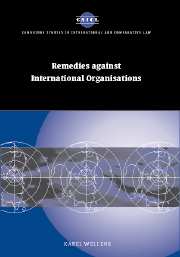Book contents
- Frontmatter
- Contents
- Acknowledgements
- List of abbreviations
- Introduction
- Part I General features of remedies against international organisations
- Part II Procedural aspects of remedial action against international organisations
- Part III Substantive outcome of remedial action against international organisations
- Part IV Alternative remedial action against international organisations and options for the future
- Conclusion
- Bibliography
- Index
- CAMBRIDGE STUDIES IN INTERNATIONAL AND COMPARATIVE LAW
Introduction
Published online by Cambridge University Press: 13 July 2009
- Frontmatter
- Contents
- Acknowledgements
- List of abbreviations
- Introduction
- Part I General features of remedies against international organisations
- Part II Procedural aspects of remedial action against international organisations
- Part III Substantive outcome of remedial action against international organisations
- Part IV Alternative remedial action against international organisations and options for the future
- Conclusion
- Bibliography
- Index
- CAMBRIDGE STUDIES IN INTERNATIONAL AND COMPARATIVE LAW
Summary
During the second half of the twentieth century, international organisations have become important actors on the international scene, alongside states and multinational corporations, as a result of their proliferation and the subsequent unprecedented worldwide expansion of their institutional and operational activities. Whereas the international political and legal order has designed and put in place a comprehensive body of primary rules governing the acts, conduct and omissions of the main actors, coupled with an evolving system of secondary rules on the consequences of state responsibility, nothing similar appears to have occurred with regard to international organisations. Even the international legal framework governing the position of the individual, in both its protective and repressive aspect, seems to be well ahead of an analogous development for international organisations.
Although this picture mainly reflects the general perception and claims to correspond to present-day realities, it has to be qualified in several ways. First, it would be incorrect to assume that the conduct of international organisations escapes the governance of the international political and legal order altogether, even if only in terms of the imperatives flowing from the instrument establishing each international organisation in the first place. As subjects of international law, international organisations have to abide in good faith by the treaties to which they have become parties, they are subject to rules and norms of customary international law to the extent required by their functional powers and they have to observe the general principles of law recognised by civilised nations.
- Type
- Chapter
- Information
- Remedies against International Organisations , pp. 1 - 4Publisher: Cambridge University PressPrint publication year: 2002

